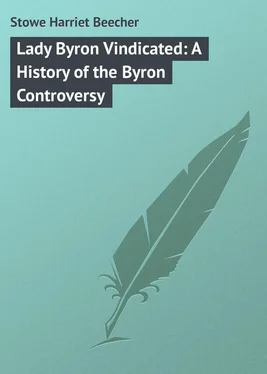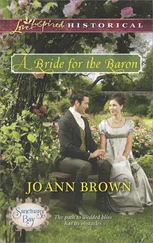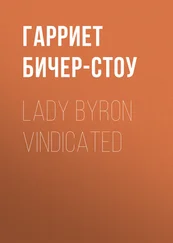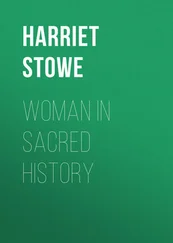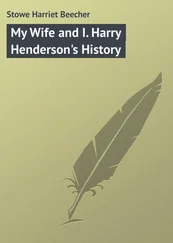Harriet Stowe - Lady Byron Vindicated - A History of the Byron Controversy
Здесь есть возможность читать онлайн «Harriet Stowe - Lady Byron Vindicated - A History of the Byron Controversy» — ознакомительный отрывок электронной книги совершенно бесплатно, а после прочтения отрывка купить полную версию. В некоторых случаях можно слушать аудио, скачать через торрент в формате fb2 и присутствует краткое содержание. ISBN: , Жанр: foreign_prose, на английском языке. Описание произведения, (предисловие) а так же отзывы посетителей доступны на портале библиотеки ЛибКат.
- Название:Lady Byron Vindicated: A History of the Byron Controversy
- Автор:
- Жанр:
- Год:неизвестен
- ISBN:http://www.gutenberg.org/ebooks/44791
- Рейтинг книги:3 / 5. Голосов: 1
-
Избранное:Добавить в избранное
- Отзывы:
-
Ваша оценка:
- 60
- 1
- 2
- 3
- 4
- 5
Lady Byron Vindicated: A History of the Byron Controversy: краткое содержание, описание и аннотация
Предлагаем к чтению аннотацию, описание, краткое содержание или предисловие (зависит от того, что написал сам автор книги «Lady Byron Vindicated: A History of the Byron Controversy»). Если вы не нашли необходимую информацию о книге — напишите в комментариях, мы постараемся отыскать её.
Lady Byron Vindicated: A History of the Byron Controversy — читать онлайн ознакомительный отрывок
Ниже представлен текст книги, разбитый по страницам. Система сохранения места последней прочитанной страницы, позволяет с удобством читать онлайн бесплатно книгу «Lady Byron Vindicated: A History of the Byron Controversy», без необходимости каждый раз заново искать на чём Вы остановились. Поставьте закладку, и сможете в любой момент перейти на страницу, на которой закончили чтение.
Интервал:
Закладка:
At all events, when Lady Byron spoke, the world listened with respect, and believed what she said.
Here let us, too, read her statement, and give it the careful attention she solicits (Moore's 'Life of Byron,' vol. vi. p. 275): —
'I have disregarded various publications in which facts within my own knowledge have been grossly misrepresented; but I am called upon to notice some of the erroneous statements proceeding from one who claims to be considered as Lord Byron's confidential and authorised friend. Domestic details ought not to be intruded on the public attention: if, however, they are so intruded, the persons affected by them have a right to refute injurious charges. Mr. Moore has promulgated his own impressions of private events in which I was most nearly concerned, as if he possessed a competent knowledge of the subject. Having survived Lord Byron, I feel increased reluctance to advert to any circumstances connected with the period of my marriage; nor is it now my intention to disclose them further than may be indispensably requisite for the end I have in view. Self-vindication is not the motive which actuates me to make this appeal, and the spirit of accusation is unmingled with it; but when the conduct of my parents is brought forward in a disgraceful light by the passages selected from Lord Byron's letters, and by the remarks of his biographer, I feel bound to justify their characters from imputations which I know to be false. The passages from Lord Byron's letters, to which I refer, are, – the aspersion on my mother's character (p. 648, l. 4): 19 19 The references are to the first volume of the first edition of Moore's Life', originally published by itself.
"My child is very well and flourishing, I hear; but I must see also. I feel no disposition to resign it to the contagion of its grandmother's society ." The assertion of her dishonourable conduct in employing a spy (p. 645, l. 7, &c.): "A Mrs. C. (now a kind of housekeeper and spy of Lady N.'s ), who, in her better days, was a washerwoman, is supposed to be – by the learned – very much the occult cause of our domestic discrepancies." The seeming exculpation of myself in the extract (p. 646), with the words immediately following it, "Her nearest relations are a – ;" where the blank clearly implies something too offensive for publication. These passages tend to throw suspicion on my parents, and give reason to ascribe the separation either to their direct agency, or to that of "officious spies" employed by them. 20 20 'The officious spies of his privacy,' p. 650.
From the following part of the narrative (p. 642), it must also be inferred that an undue influence was exercised by them for the accomplishment of this purpose: "It was in a few weeks after the latter communication between us (Lord Byron and Mr. Moore) that Lady Byron adopted the determination of parting from him. She had left London at the latter end of January, on a visit to her father's house in Leicestershire; and Lord Byron was in a short time to follow her. They had parted in the utmost kindness, – she wrote him a letter, full of playfulness and affection, on the road; and, immediately on her arrival at Kirkby Mallory, her father wrote to acquaint Lord Byron that she would return to him no more."
'In my observations upon this statement, I shall, as far as possible, avoid touching on any matters relating personally to Lord Byron and myself. The facts are, – I left London for Kirkby Mallory, the residence of my father and mother, on the 15th of January, 1816. Lord Byron had signified to me in writing (Jan. 6) his absolute desire that I should leave London on the earliest day that I could conveniently fix. It was not safe for me to undertake the fatigue of a journey sooner than the 15th. Previously to my departure, it had been strongly impressed on my mind that Lord Byron was under the influence of insanity. This opinion was derived in a great measure from the communications made to me by his nearest relatives and personal attendant, who had more opportunities than myself of observing him during the latter part of my stay in town. It was even represented to me that he was in danger of destroying himself. With the concurrence of his family , I had consulted Dr. Baillie, as a friend (Jan. 8), respecting this supposed malady. On acquainting him with the state of the case, and with Lord Byron's desire that I should leave London, Dr. Baillie thought that my absence might be advisable as an experiment, assuming the fact of mental derangement; for Dr. Baillie, not having had access to Lord Byron, could not pronounce a positive opinion on that point. He enjoined that, in correspondence with Lord Byron, I should avoid all but light and soothing topics. Under these impressions I left London, determined to follow the advice given by Dr. Baillie. Whatever might have been the nature of Lord Byron's conduct towards me from the time of my marriage, yet, supposing him to be in a state of mental alienation, it was not for me , nor for any person of common humanity, to manifest at that moment a sense of injury. On the day of my departure, and again on my arrival at Kirkby (Jan. 16), I wrote to Lord Byron in a kind and cheerful tone, according to those medical directions.
'The last letter was circulated, and employed as a pretext for the charge of my having been subsequently influenced to "desert" 21 21 'The deserted husband,' p. 651.
my husband. It has been argued that I parted from Lord Byron in perfect harmony; that feelings incompatible with any deep sense of injury had dictated the letter which I addressed to him; and that my sentiments must have been changed by persuasion and interference when I was under the roof of my parents. These assertions and inferences are wholly destitute of foundation. When I arrived at Kirkby Mallory, my parents were unacquainted with the existence of any causes likely to destroy my prospects of happiness; and, when I communicated to them the opinion which had been formed concerning Lord Byron's state of mind, they were most anxious to promote his restoration by every means in their power. They assured those relations who were with him in London, that "they would devote their whole care and attention to the alleviation of his malady;" and hoped to make the best arrangements for his comfort if he could be induced to visit them.
'With these intentions, my mother wrote on the 17th to Lord Byron, inviting him to Kirkby Mallory. She had always treated him with an affectionate consideration and indulgence, which extended to every little peculiarity of his feelings. Never did an irritating word escape her lips in her whole intercourse with him. The accounts given me after I left Lord Byron, by the persons in constant intercourse with him, added to those doubts which had before transiently occurred to my mind as to the reality of the alleged disease; and the reports of his medical attendant were far from establishing the existence of anything like lunacy. Under this uncertainty, I deemed it right to communicate to my parents, that, if I were to consider Lord Byron's past conduct as that of a person of sound mind, nothing could induce me to return to him. It therefore appeared expedient, both to them and myself, to consult the ablest advisers. For that object, and also to obtain still further information respecting the appearances which seemed to indicate mental derangement, my mother determined to go to London. She was empowered by me to take legal opinions on a written statement of mine, though I had then reasons for reserving a part of the case from the knowledge even of my father and mother. Being convinced by the result of these inquiries, and by the tenor of Lord Byron's proceedings, that the notion of insanity was an illusion, I no longer hesitated to authorise such measures as were necessary in order to secure me from being ever again placed in his power. Conformably with this resolution, my father wrote to him on the 2nd of February to propose an amicable separation. Lord Byron at first rejected this proposal; but when it was distinctly notified to him that, if he persisted in his refusal, recourse must be had to legal measures, he agreed to sign a deed of separation. Upon applying to Dr. Lushington, who was intimately acquainted with all the circumstances, to state in writing what he recollected upon this subject, I received from him the following letter, by which it will be manifest that my mother cannot have been actuated by any hostile or ungenerous motives towards Lord Byron: —
Читать дальшеИнтервал:
Закладка:
Похожие книги на «Lady Byron Vindicated: A History of the Byron Controversy»
Представляем Вашему вниманию похожие книги на «Lady Byron Vindicated: A History of the Byron Controversy» списком для выбора. Мы отобрали схожую по названию и смыслу литературу в надежде предоставить читателям больше вариантов отыскать новые, интересные, ещё непрочитанные произведения.
Обсуждение, отзывы о книге «Lady Byron Vindicated: A History of the Byron Controversy» и просто собственные мнения читателей. Оставьте ваши комментарии, напишите, что Вы думаете о произведении, его смысле или главных героях. Укажите что конкретно понравилось, а что нет, и почему Вы так считаете.
